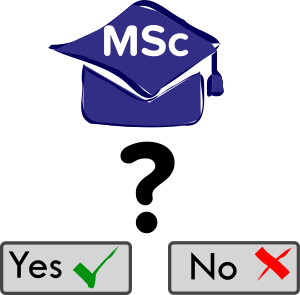To Be an MSc Student or Not to Be, That Is the Question — or Is It?
My longest commitment in my life was my undergraduate study: in the span of 4.5 years, I did not ‘quit’ and thrived for the goal of graduating as a Bachelor of Computer Science. Even I dropped out of ‘formal’ elementary school — which supposed to take 6 years in Indonesia — after finishing 4th grade.
How much time should you be committed to something so you can claim yourself as “a commmited person”?

My office work was no better. I have 2 real work experiences listed on my CV (real as in employed by a certain company), and the longest one was my most recent one prior to my master study: 1.5 years of working as a software engineer for a friend-turned-into-CEO’s startup company.
The first few months of work were exciting for me, I got to learn new things every day with new challenges to solve. But then — as cliché as it may seem — nothing lasts forever. The excitement tones down as every day’s activities turn into routines, and I feel like my skill set was not growing. It’s just the same thing I had to do every day. It was boredom.
MSc as an Alternative “Career” Path
That was when I started to consider taking another path: taking a master degree. Again, my reason was not solely because “I want to gain more knowledge..and so on” (well it is true to some extent), but it was mostly because I felt stuck on the same position and needed a change of pace.
So that’s why I decided to take a chance by working on my application to an MSc programme. As I wasn’t really sure on what specialization that I would want to take back then, I slimmed down my university options to one — TU Delft — which offers an MSc in Computer Science programme without strict specialization (at least when we start, by the second year we need to decide in which research group we’d like to work our thesis in).
Then, I also started to seek possible scholarship options, back then the options were either LPDP, Beasiswa Menkominfo, and TU Delft Excellence Scholarship. Note that taking an MSc degree without scholarship would not be an option for me, it was way more reasonable for me to figure out how to not get bored in my job while being paid, rather than spending a fortune for a Master degree just to be “not bored”.
There was another condition which I imposed on myself: I had to work as hard as possible to get accepted — if by the end I didn’t get admitted and/or didn’t acquire a scholarship, I would take it as a sign that MSc was not the way for me.
Results?
I honestly felt really lucky back then: the first time was when I got my acceptance letter and the second time was when my scholarship application got nominated and eventually be selected as one of the Excellence Scholarship recipients. My application for the Menkominfo scholarship was in fact got rejected, which I almost took a sign to give up on my pursuit towards a graduate study.
Takeaways
This post is not the kind of post like “many failures come before success” type of post. This post is just to show that sometimes you don’t really need a strong “why” to do something. You just have to do it — even boredom can be the most ‘logical’ reason for you to take a step forward.
Sometimes for some people, you don’t have to have a “reason” to take a graduate degree (or any other life choices). “Just because.”
No, I am not saying that you should take a master degree if you’re bored with your current job (gosh, you should be grateful you actually have a job). A master degree is not for everyone. It is also not necessary. It’s just if you feel stuck — just like me back then — do check your available options.
